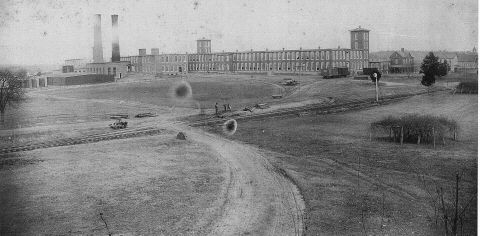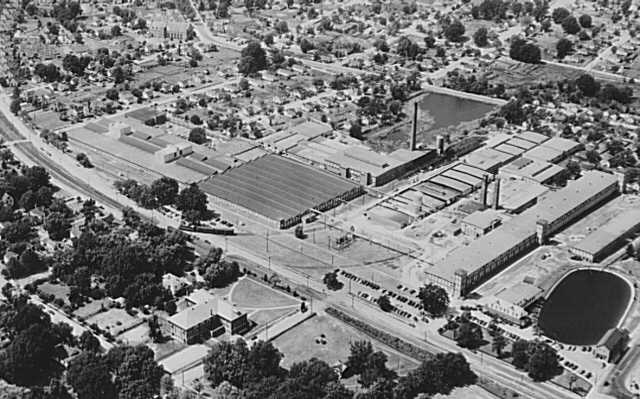Settlement of Pinhook

One of the earliest photographs taken of Erwin Mills, this image was captured from where Pinhook once stood. Note the dirt road crossing the railroad tracks and the grape arbors. West Durham Methodist Church (far right) is now the Ninth Street BP station. (Courtesy of OWD friend, Joe Johnson, Erwin Mills History Museum, Erwin, NC)
by W.S Lockhart (The Trinity Archive, 1906)
The student of history has long ago learned that the situation of a country and the nature of the soil are large factors in determining the character of a people. This is especially true of the section in which Durham is situated. The city is built on a low ridge which serves as a watershed between the Eno and the Neuse on the north, and New Hope creek, which is a tributary of the Cape Fear, on the south. As might be expected the soil is poor and unsuited to the cultivation of most crops that a pioneer would be likely to raise. So a student is likely to conclude that in the early settlement of the country this section would not be taken up by the first settlers. The more fertile tracts along the New Hope on the south and the Eno and Neuse on the west and north attracted the new home-seekers and the land lying between them was for some time left vacant. Later on, when the settlements became more thickly populated, the shiftless were pushed out of the fertile acres and came into this poor section of country and built themselves homes. As all know, the shiftless and poor are liable to give way to the less refined forms of vice and we find the people of this section no exception to the rule. Also it is likely that the vicious element from adjacent sections drifted into such places as this, being spurned by the more wealthy communities. As proof of the poverty of these people one only has to drive out along the country roads in any direction from Durham. He will have to go almost a dozen miles before he finds a house of any consequence that was built before the Civil War.
The foregoing, I think, accounts largely for the straitened condition and low morality of a large number of the old inhabitants of this section, for almost any old citizen can, if he chooses, tell you interesting tales concerning the exploits of certain characters who used to live here. These people generally lived in little communities, each of which had a distinctive name. One of these places which was in what is now the suburbs of the city of Durham was called Pinhook.

Pinhook stood about where the clump of trees just north of the railroad
tracks is shown in this photo. Today, the Erwin Square tower casts its
shadow across the site of the old settlement.
Pinhook was near the place where the West Durham Cotton Mill has been erected. The house stood about a hundred yards southwest of the southwest corner of the mill. Some questionable characters kept a resort there, and near by there was a grog shop. Why the place was called Pinhook is not known, but it certainly went by I that name for a number of years before the Civil War.
Near this place was a camping ground where wagoners stopped on their way to Raleigh and other eastern towns before the time of railroads. The campers got water from the Pinhook well and made use of the grove near by, where they tied their horses and were protected somewhat by the trees from the weather. It is said that a man, who later was a citizen of Durham and became quite rich, was a pale, sallow-looking boy at the time Pinhook was experiencing its balmiest days. He carried watermelons out to the old camp ground, piled them up in the fence corners, and sold them to the wagoners who doubtless found them refreshing after their long draughts of fiery corn liquor which they bought from the Pinhook grog shop. In this way he started a fortune which became quite considerable before his death.
Besides being a favorite stopping-place for the wagoners, Pinhook was known for miles around. Its fame spread as far as twelve or fifteen miles northwest, as may to this day be learned from the old inhabitants of the country communities, and even the students of the University at Chapel Hill had the habit of coming over when they wished to go off on a lark. It was known as a place of brawls and rough-and-tumble fights, drinking, gambling and other forms of amusement, where the natives and visitors met to have a rough, roaring, and to them, glorious time.
Pinhook was the best known of a number of houses of rather shady reputation around West Durham and a little west of it. The section from this settlement as far east as the wye near East Durham was, in the language of a citizen of Durham, "a roaring old place" before and for a while after the war. Down near the wye, a man named Vickers kept a liquor shop, and just west of him one William Pratt, who was quite a wealthy man for this time, also dispensed "the universal panacea." It may be added that at various times liquor was sold at several other places in what is now the city of Durham.
An amusing incident is told of an old man of the neighborhood, now many years dead, who, not to mention a rather ordinary cognomen, gloried in the praenomen, "Wash." He was a notorious rowdy, a man who drank and was known far and wide for his boisterous carousing. When the North Carolina Railroad was in process of construction, it was announced that on a certain day a train would approach within a few miles of the place where Durham is now situated. Many of the people of the community collected at the appointed time to see the new wonder. Among these were the aforementioned "Wash" and his wife. Like almost all trains, ancient and modern, this train was late and after waiting some time "Wash" announced that he was thirsty. So with much fussing and in spite of the protestations of his wife he declared that he was going to Vickers's tavern to get him some liquor. The good lady objected in a most strenuous manner, urging the great danger from the expected train, but "Wash" was obdurate. He, therefore, secured a bushel of corn, a gallon jug and a blind horse and set out. It was not more than a mile to the tavern and it so happened that the ever watchful Mrs. "Wash" spied the train approaching from one direction and her husband from the other at the same time. Screaming at the top of her voice and with outstretched arms she ran to meet her beloved spouse. Before she reached him the train passed and the blind horse, frightened by the unusual noise, threw the doughty tippler and broke his jug. Immediately Mrs. "Wash's" fear was turned into joy and she ran back to her friends, clapping her hands and shouting: "Glory to God! 'Wash' is safe and his jug of liquor's broke!"
With the growth of the city of Durham these old inhabitants learned new ways and many of their descendents are now regarded as the city's most valuable citizens. Indeed, with new conditions, the old have almost been forgotten and it will be only a few years till you cannot find a man who ever heard of Pinhook. Thus the old is being continually swallowed up by the new.
Source: The Trinity Archive (Volume 19, February 1906). With special thanks to Duke University Archives

